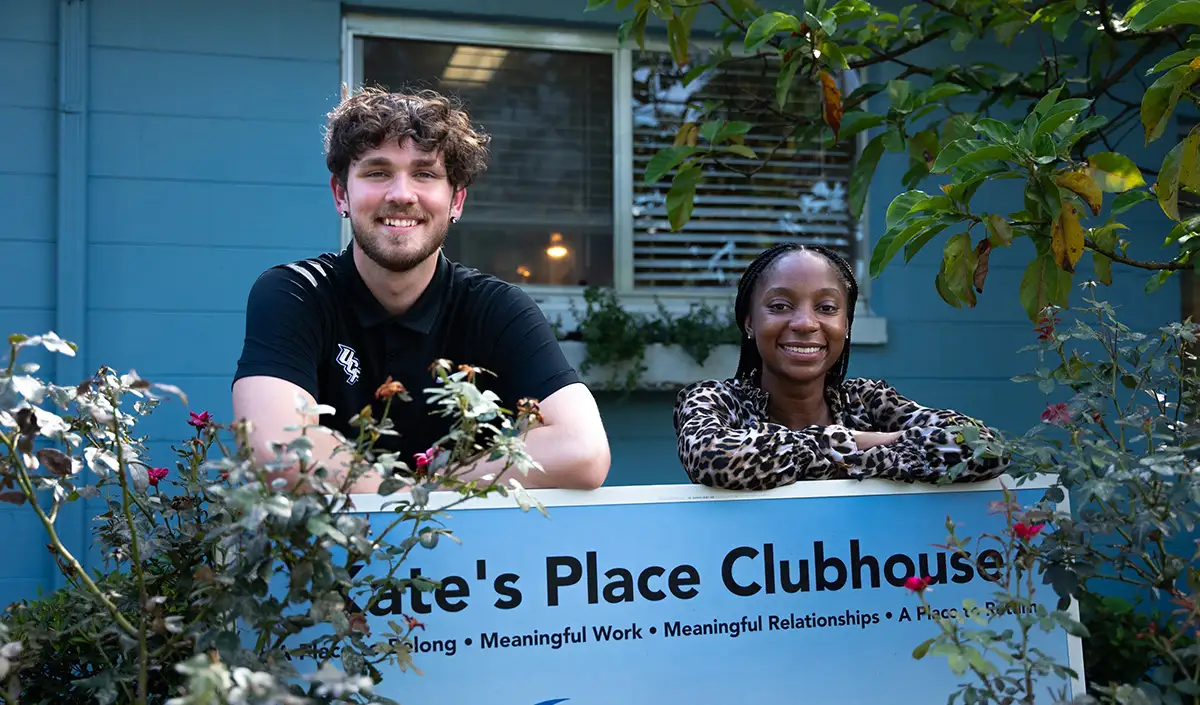Two students discovered the career path they now want to follow thanks to an internship provided by the Department of Counselor Education and School Psychology.
BY NATALIE FEDOR | SEPTEMBER 18, 2023

Clinical mental health counseling master's students Stephen Conner and Maya Reaves both work at Kate's Place Clubhouse, where they also serve as apprentices for the UCF-Aspire Recovery Support Specialist program. (Photo by Blake Osting)
What began as a paid internship opportunity through a minor in human services turned into a career-altering decision for two clinical mental health counseling master’s students.
Christopher Campos ’21 and Maya Reaves ’23 each completed two semesters of the UCF-Aspire Recovery Support Specialist training and internship opportunity, a federally funded program that encourages students to become paraprofessionals trained to work in recovery services for individuals with opioid-use disorders and mental health co-occurring disorders.
In the facilities, students work alongside clinical staff to provide support to and advocate for clients, monitor their progress and family visits, assist therapy staff with group activities and connect clients with resources.
Upon completing the internship program, Campos and Reaves entered an apprenticeship phase where they receive more responsibility in their respective treatment centers and help mentor new interns. Campos, who started in the clinical mental health counseling master's program last year, now works for Aspire full-time as a case manager and Reaves is now an apprentice with Aspire and starts her master’s program in Fall 2023.
It was the hands-on work experience that both Campos and Reaves say encouraged them to continue in this field.
“One of the biggest things for me was that it was real life experience,” says Campos, who was a psychology major in undergrad. “Psychology is one of the biggest majors at UCF, but it's very general, so I wanted to really gain experience of what that looked like outside of classes. You're interacting with people dealing with addiction and mental health.”
Reaves says she came from an entirely different background when she found the internship program.
“One major thing that I learned is what I want to do for the rest of my life,” Reaves says. “I initially wanted to be a physical therapist. I still love physical therapy, I still love kinesiology, but my calling is therapy and helping those with mental illness or co-occurring disorders.”
Reaves says she felt that the internship program prepared her to interact with people struggling with these disorders. For her, engaging with clients was something that made her think she could see herself doing it for the rest of her life.
“The clients see us as staff: They don’t see us and think, ‘She’s an intern, I’m not going to tell her about my problems’ — they open up to you,” she says. “It teaches you how to process things with clients and help them to feel better.”
Students accepted into the recovery support specialist program are required to complete the human services minor. During their internship, they receive stipend funding for two consecutive semesters. Upon completion of the coursework and their internship, they also receive funding towards tuition reimbursement. Reaves and Campos both chose to go on to pursue graduate degrees following their internships.
"I'm grateful for the internship,” Reaves says. “I'm grateful that it helped me find the career that I want it to be in. You really get connections with the master's program, too, because one of the perks of the internship is you get to sit in a master's level class. When I saw the teaching and the way all the students were interacting, I could see myself there. Now, in August, I'm going to be in that class, so I'm very excited.”